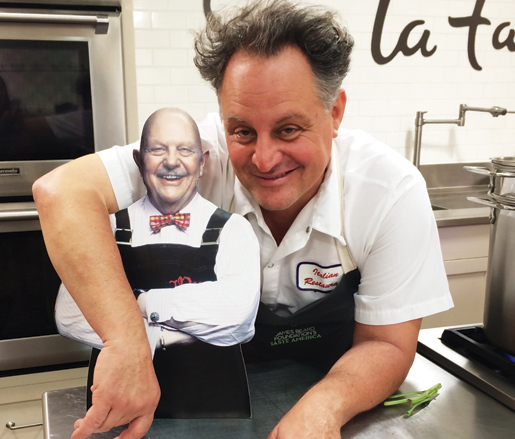
To kick off our celebration of artisans around the country, here's an interview with Beard Award winner Chris Bianco, who tells us how his work is powered by his relationships with staff and local producers.
--
JBF: You’ve mentioned that you wound up in Phoenix because you ran out of gas on your journey from the Bronx to California. What would you be missing out on if you’d ended up somewhere else?
Chris Bianco: Well, then that would have been the place I was supposed to be. Hopefully I would have connected to it in the way that I’ve connected to Phoenix. That was the reason I ended up staying, because I felt that connection. Somewhere else it would have been for that same feeling. The outcome might have had a slightly different flavor, but I am confident you would have been able to recognize it.
JBF: You’ve said that you’re in the business of relationships. What do you mean by that in terms of how you run your restaurants?
CB: What I mean is that everything is dependent on your relationships—whether it’s with the
environment and whether it’s raining enough to support the crops and the farmers who are harvesting them, or my relationship with my staff and communicating with them about what they’re serving, and, of course, my relationship with everyone who supports the restaurant. If any of those relationships are neglected or out of balance, nothing ends up making much sense at all.
JBF: What are some of the biggest changes you’ve made over the years in how you source ingredients?
CB: I think that’s just the natural evolution in this fortunate community we live in. When I first started out, there wasn’t the plethora of ranchers and farmers producing the variety of heirloom vegetables and fruits. And speaking of relationships, keeping those nurtured helps us know about what’s currently out there and stay abreast of the seasonality of the environment we live in: what’s at the height of the season, the ripeness of what’s currently available, and what flavor profiles they have.
JBF: You are known for working with local ingredients. What are some of your favorites?
CB: We are blessed to have many prized local ingredients. A few of them are the wild Sonoran chiltepin chiles and the fresh bay trees that sit outside our window. We also have an incredible variety of citrus, including Meyer lemons and blood oranges, along with our faithful fig tree in the garden at the pizzeria. And the pistachios we use on the Rosa pizza come from southern Arizona.
JBF: At a time when the trend among chefs is to do it yourself, you tend to seek out artisans to
partner with. What are some of the products of these partnerships, and who are some of the local artisans you work with?
CB: I always say it takes a village, or a community, and whether it’s the cobbler and the candlestick maker or the baker and the butcher, we all play a small role in making this world what it is—and here, I go back to the importance of relationships. I have had very personal relationships with many of our artisan suppliers since I first began in 1998. I’ve known several of the farmers that I’m still working with for nearly 20 years. Bob McClendon is a beautiful man and farms some of the tastiest organics the earth can provide. I still see him at the weekly farmers’ market and I join him just about each week that he comes into the restaurant for lunch. We’ve also been working with our friends at Schreiner’s Fine Sausage for just about as long. They’ve been in the same building for around 50 years and they make the sausage for our Wiseguy pizza to our specs.
On the other side of the table, we now have a company, Bianco DiNapoli, that produces the tomatoes for our pizza and pasta sauce. It started with my relationship with Rob DiNapoli, a third- generation California tomato provider. We now have relationships with the farmers who grow our tomatoes, as well as the packers and cannery folks. It all adds up to what ends up in the can of our tomatoes, which we think are pretty good. These are just a few of the key relationships that help us bring the food to the table.






